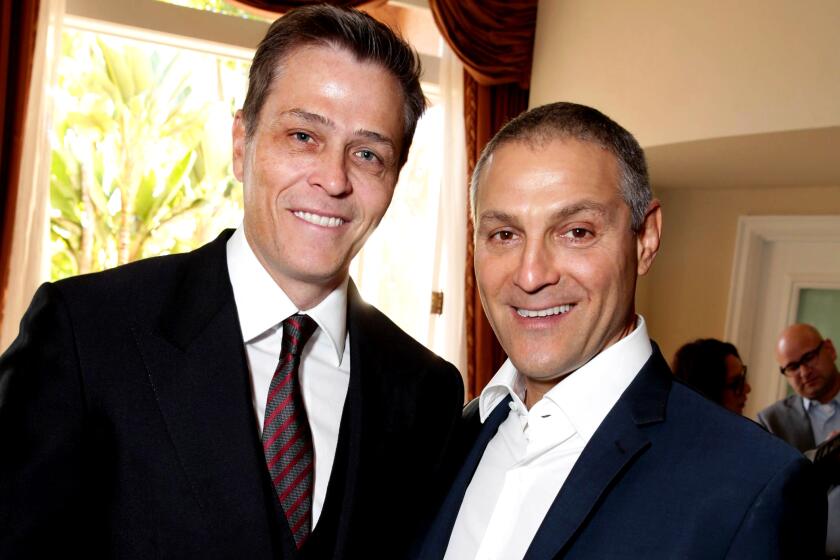Review: South Korean pianist Seong-Jin Cho makes an electrifying L.A. Phil debut
- Share via
An attentive and enthusiastic contingent of Korean concert-goers turned up for Seong-Jin Cho’s packed recital debut at Walt Disney Concert Hall on Wednesday night. In 2015, Cho became the first South Korean to win the prestigious gold medal at the Chopin International Competition in Warsaw.
The award made the Seoul-born Cho, now 24, a celebrity at home and gave him global recognition. Such an honor comes with enormous pressures — previous winners include Maurizio Pollini and Martha Argerich — as well as major benefits including a big cash prize. One result of his win was a recording contract with Deutsche Grammophon, which has already released Cho’s persuasive discs of music by Debussy, and Chopin’s Ballades and Piano Concerto No. 1 with the London Symphony Orchestra, conducted by Gianandrea Noseda.
In a program of works by Debussy and Chopin, the self-possessed Cho made a strong case that he is on the threshold of a major career. Refreshingly, there were no keyboard theatrics (his discreet wiping of brow and piano keys with a handkerchief before each piece was strictly utilitarian) or moony looks skyward during romantic interludes. Nor was there anything willful or mannered about his playing, which was consistently focused on each composer’s unique sound world.
Put simply, it was an evocative recital in which Cho made abstract scores feel, as Debussy once said about his own music, as if they had “the air of not having been written down.”
Throughout, Cho displayed an alternately restrained, poetic and fiery temperament. In the opening piece, Debussy’s “Reflets dans l’eau (Reflections in the water)” from “Images,” Book 1, he quickly conveyed refinement and a nuanced sensitivity to sound. Cho left Korea in 2012 to study at the Conservatoire de Paris — where Debussy himself studied for 11 years — and much of what he learned there was evident in his formidable tonal capabilities, always alert to Debussy’s play of sonorities and resonances.
His caressing way with the slow sarabande of “Hommage à Rameau” paid dividends in the two subtly powerful climaxes, and his precision in the ceaseless third piece in the set, “Mouvement,” made for an exciting finish.
But that was just a warm-up for his subsequent readings of Chopin’s Ballade No. 3, (Op. 47) and the harmonic daring of the Polonaise-Fantaisie (Op. 61), a precursor to Debussy’s atmospheric sound world. Cho reveled in the lilting opening and bravura closing section of the Ballade, and kept in check the improvisatory quality of the Fantaisie, with its spacious formal discontinuity and explosive contrasts. The pianist also brought reverie and abandon to the score’s extended slow section.
After intermission, Cho gave convincing renditions of Debussy’s three “Images,” from Book 2, including a luminous rendition of the third, “Poissons d’or” (Golden fish). In Cho’s hands these were big fish, but still exciting to follow in the colorful rapidity of their movement.
In Chopin’s daunting Sonata No. 3, Cho’s virtuosity came to the fore in a turbulent account of the opening movement, continuing to a presto Finale in which he generated tremendous momentum. Cho’s songlike way with the Largo — the heart of the sonata — didn’t always maintain structural clarity, but on the whole Cho’s interpretation offered convincing sweep.
Both sides of the pianist’s artistic temperament were represented in two encores: a contemplative rendition of Debussy’s ethereal “Clair de lune,” performed with a restraint that informed much of his recital, and an electrifying account of Liszt’s “Transcendental Etude” No. 10 in F minor. Here Cho indulged his purely demonic side, bringing a third great revolutionary composer for the piano on stage along with Chopin and Debussy to take a bow.
More to Read
The biggest entertainment stories
Get our big stories about Hollywood, film, television, music, arts, culture and more right in your inbox as soon as they publish.
You may occasionally receive promotional content from the Los Angeles Times.










